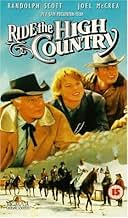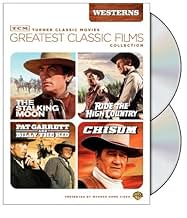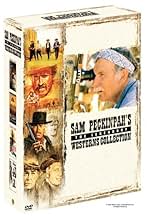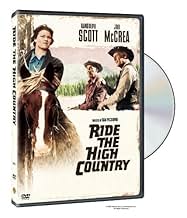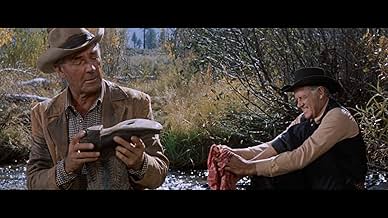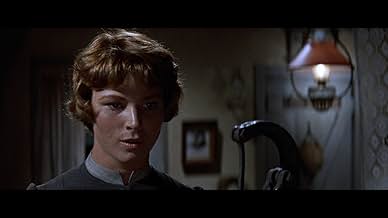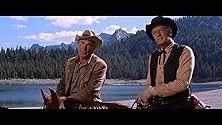CALIFICACIÓN DE IMDb
7.4/10
16 k
TU CALIFICACIÓN
Un exsoldado de la Unión es contratado para transportar el oro de una comunidad minera a través de un territorio peligroso sin que su socio y viejo amigo tiene otros planes.Un exsoldado de la Unión es contratado para transportar el oro de una comunidad minera a través de un territorio peligroso sin que su socio y viejo amigo tiene otros planes.Un exsoldado de la Unión es contratado para transportar el oro de una comunidad minera a través de un territorio peligroso sin que su socio y viejo amigo tiene otros planes.
- Dirección
- Guionistas
- Elenco
- Nominada a1 premio BAFTA
- 2 premios ganados y 2 nominaciones en total
Alice Allyn
- Candy
- (sin créditos)
George Bell
- Townsman
- (sin créditos)
Oscar Blank
- Miner
- (sin créditos)
Chet Brandenburg
- Miner
- (sin créditos)
Don Brodie
- Spieler
- (sin créditos)
Chris Carter
- Rose
- (sin créditos)
- Dirección
- Guionistas
- Todo el elenco y el equipo
- Producción, taquilla y más en IMDbPro
Opiniones destacadas
Aging ex-lawman Joel McCrea is hired to protect gold shipment and asks old friend Randolph Scott to join him. Scott brings a young sidekick (Ron Starr) with him and has intentions of robbing the gold shipment, with or without McCrea's help. Last hurrah for western stars Randolph Scott and Joel McCrea. Scott's last film completely and McCrea's last worth mentioning. It's funny but I never really think of Joel McCrea as a western star. I know he did a lot of them, particularly in the later half of his career, but I always preferred his comedy and drama roles from earlier on. The westerns he did were not that impressive to me. Scott, on the other hand, was a bona fide western legend on the basis of his Boetticher films alone. Mariette Hartley is good in her film debut. Ron Starr is the film's weak link. It's not surprising he would have a limited acting career. It's been said by many to be Sam Peckinpah's best film. Is it? I'm not quite there but I do believe it's one of his least self-indulgent films. He's not one of my favorite directors but he did do some good work. This is right up there. It's not a perfect film. The first half is kind of pedestrian for a film with such a high reputation. But the second half delivers and you can see why many call this a classic.
An above average Western featuring two of the genres most recognizable stars, Joel McCrea and Randolph Scott (in his last film). Both men have a history together as outlaws, but McCrea has gone straight and is now in charge of getting the gold from the mines to the bank. To help him, he hires his old friend Scott who, along with a young hothead (Ron Starr), is in town dressed up like "Buffalo Bill" and demonstrating his fancy shooting.
Scott believes he can persuade his old partner to split the gold with him before they return, and must act as a buffer between the impatient young ruffian and his old friend. While en route, the three encounter a religious farmer (R. G. Armstrong) and his under socialized daughter (Mariette Hartley), who steals away to join them.
The trouble really begins when they get to the remote mining town, encountering an inbred mountain family of hoodlums (which includes Warren Oates) and its judge (Edgar Buchanan).
Directed by Sam Peckinpah, and written by N.B. Stone Jr., it was added to the National Film Registry in 1992.
Scott believes he can persuade his old partner to split the gold with him before they return, and must act as a buffer between the impatient young ruffian and his old friend. While en route, the three encounter a religious farmer (R. G. Armstrong) and his under socialized daughter (Mariette Hartley), who steals away to join them.
The trouble really begins when they get to the remote mining town, encountering an inbred mountain family of hoodlums (which includes Warren Oates) and its judge (Edgar Buchanan).
Directed by Sam Peckinpah, and written by N.B. Stone Jr., it was added to the National Film Registry in 1992.
After a time working as director and writer of Western TV Series, Sam Peckinpah started his career on film with "The Deadly Companions",a romantic Western that seemed like an extension of his work on TV; however, his next film, "Ride the High Country", was an completely different beast, it was a deep meditation on the long-lived Western genre that introduced themes that would become Peckinpah's obsessions and signature: the end of an era and the quest for redemption and meaning in life. This raw masterpiece faced a cold reception when it premiered, but gained a tremendous success overseas (winning the Belgium Film Festival), demonstrating to the world that this newcomer was here to stay.
Former lawman Steve Judd (Joel McCrea) is now an aging man, and is hired to transport gold from a mining community through a dangerous territory. As he has the need to hire assistants, he finds his old friend and former partner Gil Westrum (Randolph Scott) and hires him and Westrum's young protegé, Heck Longtree (Ron Starr) to assist him. However, Steve doesn't know that his two assistants are planning to steal the gold, with or without Steve's help. Things will get complicated when the trio is forced to help a young woman named Elsa (Mariette Hartley) to escape from her fianceé and his criminal brothers.
Written by another veteran of Western TV series, N.B. Stone Jr. (who without a doubt worked with Peckinpah in "The Rifleman"), "Ride The High Country" is a clear step forward in the evolution of the Western as a film genre. As one of the first "revisionist" westerns, it shows a meditation on the genre and how two aging men become outdated by their world and suddenly obsolete. Through powerful lines of dialog and a slowly and carefully constructed plot, the film shows Peckinpah's favorite themes like honor, loyalty, redemption and the destruction of the West (both the historical one and the Western genre) for the first time in one of the most moving Westerns ever. As many have pointed out, one doesn't need to like Westerns to appreciate this film, as it's basic theme of humanity facing change is an immortal one.
Peckinpah's love for the genre is quite obvious and lead to an awesome use of the genre's elements. Starting with a great camera-work that stands as a heir of John Ford's, exchanging Ford's Monument Valley for the beauty nature of Inyo National Forest in California. Forecasting the Spaghetti Western revolution, Peckinpah's realistic Western makes its first appearance, and even when it's considerably less raw than the violent world of "The Wild Bunch", it's a step ahead of the classic Western. In many ways this was not only the beginning of Peckinpah's career, but also of the revisionism in Westerns and the evolution that would change the genre forever.
The inspired casting of Randolph Scott and Joel McCrea in the lead roles is simply brilliant, as no one else but this former legends of classic Western films could embody the meaning of their characters, two old men that easily could had been the future of the many lawmen these two actor played in their lives. It was Scott's last film before retiring, and really it couldn't been a better closure for a career. Newcomers Mariette Hartley and Ron Starr represent the new West, too naive and ignorant of the past that precedes them; and both actor's performances are top-notch, although Starr is definitely the weakest link in the cast.
It's hard to believe that this movie almost was a failure in the U.S., but fortunately now it is receiving the attention it rightfully deserves. The natural landscape and the contrast of the new and the old make a great visual composition, almost as the missing link between the classic golden age of Ford and Wayne, and its modern counterparts. The film has few minor flaws, such as the average performance of some members of the cast, but nothing really annoying. Modern viewers may feel it moves too slow, but that slow pace actually enhances the feeling of that slow but steady change that suddenly caught the characters.
"Ride the High Country" is not a very famous film, but it really deserves a wider audience, not only because it introduced us to Peckinpah's film-making, but also because of its deep meditation on the Western genre and its wonderful immortal theme of mankind facing change. All in all, this film is a very recommended one, and I dare to say it's Peckinpah's first raw masterpiece. 9/10
Former lawman Steve Judd (Joel McCrea) is now an aging man, and is hired to transport gold from a mining community through a dangerous territory. As he has the need to hire assistants, he finds his old friend and former partner Gil Westrum (Randolph Scott) and hires him and Westrum's young protegé, Heck Longtree (Ron Starr) to assist him. However, Steve doesn't know that his two assistants are planning to steal the gold, with or without Steve's help. Things will get complicated when the trio is forced to help a young woman named Elsa (Mariette Hartley) to escape from her fianceé and his criminal brothers.
Written by another veteran of Western TV series, N.B. Stone Jr. (who without a doubt worked with Peckinpah in "The Rifleman"), "Ride The High Country" is a clear step forward in the evolution of the Western as a film genre. As one of the first "revisionist" westerns, it shows a meditation on the genre and how two aging men become outdated by their world and suddenly obsolete. Through powerful lines of dialog and a slowly and carefully constructed plot, the film shows Peckinpah's favorite themes like honor, loyalty, redemption and the destruction of the West (both the historical one and the Western genre) for the first time in one of the most moving Westerns ever. As many have pointed out, one doesn't need to like Westerns to appreciate this film, as it's basic theme of humanity facing change is an immortal one.
Peckinpah's love for the genre is quite obvious and lead to an awesome use of the genre's elements. Starting with a great camera-work that stands as a heir of John Ford's, exchanging Ford's Monument Valley for the beauty nature of Inyo National Forest in California. Forecasting the Spaghetti Western revolution, Peckinpah's realistic Western makes its first appearance, and even when it's considerably less raw than the violent world of "The Wild Bunch", it's a step ahead of the classic Western. In many ways this was not only the beginning of Peckinpah's career, but also of the revisionism in Westerns and the evolution that would change the genre forever.
The inspired casting of Randolph Scott and Joel McCrea in the lead roles is simply brilliant, as no one else but this former legends of classic Western films could embody the meaning of their characters, two old men that easily could had been the future of the many lawmen these two actor played in their lives. It was Scott's last film before retiring, and really it couldn't been a better closure for a career. Newcomers Mariette Hartley and Ron Starr represent the new West, too naive and ignorant of the past that precedes them; and both actor's performances are top-notch, although Starr is definitely the weakest link in the cast.
It's hard to believe that this movie almost was a failure in the U.S., but fortunately now it is receiving the attention it rightfully deserves. The natural landscape and the contrast of the new and the old make a great visual composition, almost as the missing link between the classic golden age of Ford and Wayne, and its modern counterparts. The film has few minor flaws, such as the average performance of some members of the cast, but nothing really annoying. Modern viewers may feel it moves too slow, but that slow pace actually enhances the feeling of that slow but steady change that suddenly caught the characters.
"Ride the High Country" is not a very famous film, but it really deserves a wider audience, not only because it introduced us to Peckinpah's film-making, but also because of its deep meditation on the Western genre and its wonderful immortal theme of mankind facing change. All in all, this film is a very recommended one, and I dare to say it's Peckinpah's first raw masterpiece. 9/10
Randolph Scott and Joel McCrea will probably be remembered as the top "B" western stars in movies. But their last film "Ride the High Country" stands as an "A" western and a very good one too.
Perhaps they owe this final chance to director Sam Peckinpah who turns the story into a splendid film in its genre shot in beautiful outdoor sceneries, with very well managed action scenes, a credible script, great settings and a fine musical score too.
Two moments are particularly outstanding in my opinion: the sort of "Fellinesc" sequence at the wedding with all those bizarre characters and the final showdown where Scott and McCrea face the mean Hammond brothers (John Anderson, James Drury and Warren Oates) in the "old fashioned way".
A well deserved "A" product for both actors -that amused and thrilled us western fans- through their long careers in the genre.
Perhaps they owe this final chance to director Sam Peckinpah who turns the story into a splendid film in its genre shot in beautiful outdoor sceneries, with very well managed action scenes, a credible script, great settings and a fine musical score too.
Two moments are particularly outstanding in my opinion: the sort of "Fellinesc" sequence at the wedding with all those bizarre characters and the final showdown where Scott and McCrea face the mean Hammond brothers (John Anderson, James Drury and Warren Oates) in the "old fashioned way".
A well deserved "A" product for both actors -that amused and thrilled us western fans- through their long careers in the genre.
RIDE THE HIGH COUNTRY proves that the Old West was a dangerous place for anyone willing to transport gold from a mining town to a bank with a couple of double-crossing cronies as companions and a runaway girl to protect.
JOEL McCREA and RANDOLPH SCOTT are the willing participants, a lawman and his corrupt pal, and MARIETTE HARTLEY is the girl who wants to escape the clutches of a cruel father and marry Billy Hammond (JAMES DRURY). She joins Scott and McCrea but doesn't realize what she's in for when she meets up with her ornery fiancé and his psychotic brothers, one of whom is played by WARREN OATES. She also has to contend with the advances of Scott's young pal, RON STARR, who doesn't want to see her get mixed up with Drury and his brothers.
The plot stays focused on these characters, moves slowly and is photographed with finesse by Lucien Ballard who filmed it in CinemaScope and Metrocolor in some gorgeous natural settings. It's a character-driven tale that has a moral compass but never becomes too preachy in the telling.
First-rate performances by McCrea and Scott hold the film together with the others being competent enough to stand inspection. The big mystery to me is: What happened to Ron Starr? He was certainly adequate enough and seemed to grow in the role as the film progressed, looking somewhat like a young Glenn Campbell. His bio at IMDb is very incomplete, so there's no telling what actually happened to him.
Summing up: Sturdy western with downbeat ending is interesting all the way through.
JOEL McCREA and RANDOLPH SCOTT are the willing participants, a lawman and his corrupt pal, and MARIETTE HARTLEY is the girl who wants to escape the clutches of a cruel father and marry Billy Hammond (JAMES DRURY). She joins Scott and McCrea but doesn't realize what she's in for when she meets up with her ornery fiancé and his psychotic brothers, one of whom is played by WARREN OATES. She also has to contend with the advances of Scott's young pal, RON STARR, who doesn't want to see her get mixed up with Drury and his brothers.
The plot stays focused on these characters, moves slowly and is photographed with finesse by Lucien Ballard who filmed it in CinemaScope and Metrocolor in some gorgeous natural settings. It's a character-driven tale that has a moral compass but never becomes too preachy in the telling.
First-rate performances by McCrea and Scott hold the film together with the others being competent enough to stand inspection. The big mystery to me is: What happened to Ron Starr? He was certainly adequate enough and seemed to grow in the role as the film progressed, looking somewhat like a young Glenn Campbell. His bio at IMDb is very incomplete, so there's no telling what actually happened to him.
Summing up: Sturdy western with downbeat ending is interesting all the way through.
¿Sabías que…?
- TriviaFinal film of Randolph Scott. He retired from acting once he saw the finished film, saying he wanted to quit while he was ahead and that he would never be able to better his work here.
- ErroresThe many 34-star flags, all on flagpoles, at the opening of the movie do not match the Bobby helmets, open automobiles and electric wiring over the streets. The 34-star U.S. flag was in use only from 1861-1863. There is, however, also an inconsistent 45-star flag strung across the street. That design, in use from 1896-1908, does match the movie's time setting.
- Citas
Steve Judd: All I want is to enter my house justified.
- Créditos curiososIntroducing Mariette Hartley
- ConexionesFeatured in America at the Movies (1976)
Selecciones populares
Inicia sesión para calificar y agrega a la lista de videos para obtener recomendaciones personalizadas
Detalles
- Fecha de lanzamiento
- País de origen
- Idiomas
- También se conoce como
- Ride the High Country
- Locaciones de filmación
- Mammoth Lakes, California, Estados Unidos(Twin Lake, Horseshoe Lake)
- Productora
- Ver más créditos de la compañía en IMDbPro
Taquilla
- Presupuesto
- USD 813,000 (estimado)
- Tiempo de ejecución
- 1h 34min(94 min)
- Color
- Relación de aspecto
- 2.35 : 1
Contribuir a esta página
Sugiere una edición o agrega el contenido que falta


